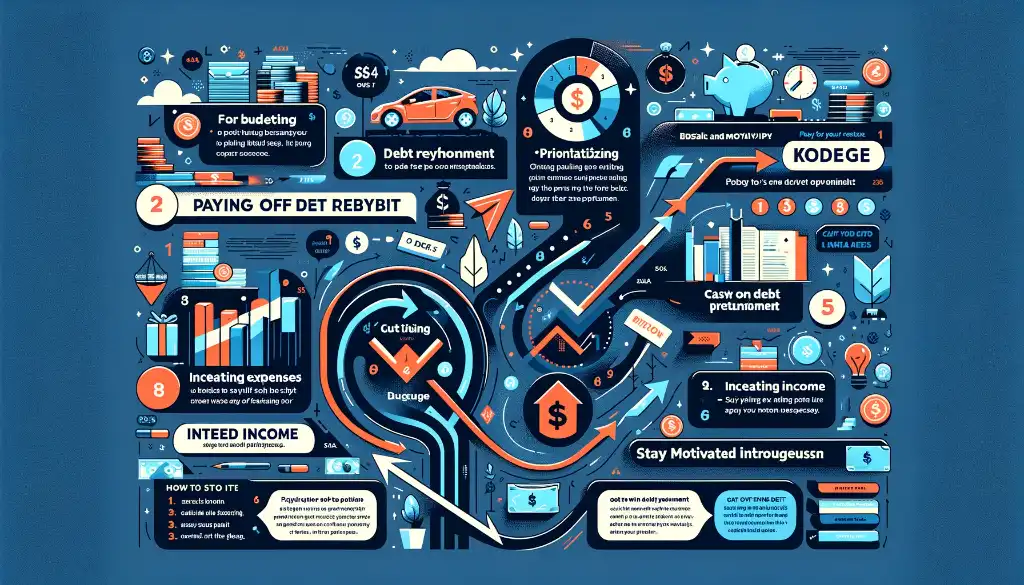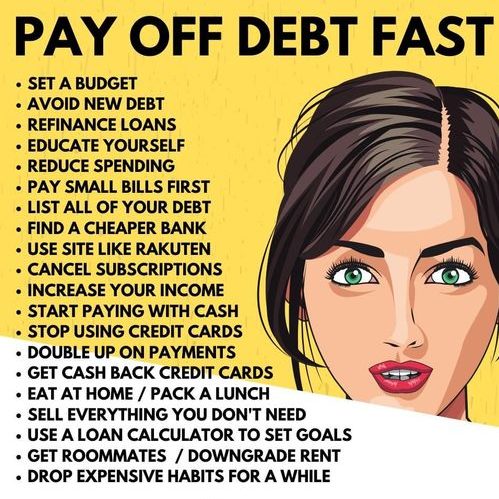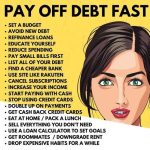Strategies to pay off debt quickly: In a world where credit is easy and consumerism is encouraged, debt can feel almost inevitable for most.
But somewhere behind the chains of owing money, many people strive for financial freedom and seek out ways to efficiently and swiftly pay off their debts.
If you’re interested in personal finances, debt management, or simply living a life free of the constraint of owing others, this blog goes through the best strategies for the process of financial liberation.

Understanding the Importance of Paying Off Debt Quickly
Before you can effectively implement an alternative debt repayment strategy, it’s important to comprehend why it’s essential, not just beneficial, to eliminate debt for good financial health.
Carrying debt can limit your ability to save, invest, and address other life events that frequently occur.
As such, creating a comprehensive plan that allows you to pay off your debts as quickly as possible is one of the most critical steps a person can take when working to achieve financial stability.
Creating a Solid Debt Repayment Plan
Creating a debt repayment plan is kind of like making a road map for a long journey. You need to understand your destination, the best possible routes, and the milestones you pass along the way. So start by doing the hard work.
Detailed budgeting techniques allow you to thoroughly analyze your income and cash flow as well as set crystal clear financial goals. Once that’s done, it’s time to prioritize your debts.
in the way that works best for you – either by interest rate or by balance as long as each one is one’s your own, and every debt that you pay off is a victory.
The Power of Snowball vs. Avalanche Method for Pay Off Debt Fast
When it comes to debt repayment strategies, two terms frequently come up: The snowball method and the Avalanche method.
Both are conditions of debt reduction plans, but they go about things differently and, ultimately, can lead to different outcomes.
The snowball method advises paying the smallest debts off first, then working your way up to the larger debts.
The idea is that clearing each small debt gives you a psychological win and extra motivation to keep going.
One of the biggest proponents of this idea is Dave Ramsey, who has a great guide to getting started with the debt snowball method at the link below.
The only caveat is it may not save you the most money on interest.
And that’s where the avalanche method comes in. The avalanche method advises tackling the highest-interest debts first, which saves you more money in the long run by reducing the interest you pay.

Also Read: How to pay off credit card debt.
It makes sense, but it’s also harder to stay motivated this way since you might end up paying off your last debt a lot later than you would with the snowball method (even if that last debt is a student loan or mortgage), and motivation is key when it comes to building good habits.
Which method is better? That depends on your personality and financial goals. The best method is, ultimately, the one you’ll stick to consistently.
Cutting Expenses and Increasing Income to Accelerate Debt Repayment
One of the most straightforward ways to create more funds for repaying your debt is to reduce your expenses.
Liquidate anything and everything. While you’re at it, double down on getting a side hustle going as a means of generating some extra cash.
Any number of financially savvy, successful entrepreneurs got their start that way. And with time, you’ll not only make back the investment but earn revenue.
Negotiating with Creditors and Utilizing Balance Transfers to Reduce Debt Burden
Use the fine art of negotiation to alleviate your debt burden. Engage creditors to see if you can get lower interest rates or payment plans that fit your financial situation. Also look into using a balance transfer credit cards strategically or consolidating debts for better rates and terms, reducing the amount of interest that accrues over time.
The Importance of Building an Emergency Fund While Paying Off Debt
Your emergency fund is your safety net, a financial cushion and should be given the same priority as paying off debt.
If you don’t have an emergency fund, an unexpected expense can quickly turn into new debt, adding to the cycle.
Be sure to use saving tips that don’t dramatically slow your debt repayment strategy so you can maintain a cohesive plan of attack.
Maintaining Motivation and Staying on Track During Your Debt-Free Journey
It is important to have rates that are motivated to remain debt-free. For example, employ the following financial discipline tips: set short-term objectives, leading up to your primary goal, celebrate every time you ace, move forward with your budget, and visualize the feeling of being free from debt.
Additionally, tracking progress is a great motivator. Watching the numbers go down month by month can provide the stamina you need to keep going.
Conclusion: Taking Control of Your Finances and Achieving a Debt-Free Life
Ultimately, it’s clear that ridding your life of debt requires dedication, a carefully considered strategic approach, and the ability to get imaginative about how you manage your money. Remember – paying off debt isn’t simply about getting immediate relief from your situation, it’s about ensuring that you can move forward, safe in the knowledge that your future finances are under your control.
So don’t delay – take control now. Put the expert tips and tricks above to use, and start on the fulfilling journey that leads to financial independence, where you can finally bask in the joy that comes from living a debt-free life.
Also Read: Top 7 Ultimate Guide to Money Saving Tips For Monthly Bills.
How long does it take to pay off debt?
How long does it take to pay off debt? The answer depends on the amount of debt, income, and the repayment strategy. Having a solid plan in place can help to pay off debt in a few years, and sometimes even sooner.
Is it better to pay off small debts first?

The snowball method advocates for paying off small debts first, creating psychological motivation and momentum. However, the avalanche method may result in greater overall savings by prioritizing high-interest debts.
How can I negotiate with creditors?
So never be satisfied with the advertised rate, says Katie Moore, vice president of auto experience for Carfax. Dealers often receive a rate from a lender that essentially lets the dealer “mark up” the rate and keep some of the difference as profit. You may be able to negotiate this difference. Try it with a large bank or credit union if the dealer can’t beat the rate.
Should I focus on building an emergency fund while paying off debt?
Yes, you need an emergency fund in place to avoid further reliance on credit should something arise. Make it a priority to save a small amount in an emergency account, even while paying off debt, to protect your newfound financial stability.
How can I stay motivated during the debt repayment process?
When repaying debt, set achievable goals, such as paying off a set amount by a milestone date, or by using the snowball method and repaying the smallest loan amount first to give you small “wins” along the way. Celebrate as you achieve your debt repayment milestones and track your progress regularly. Visualize what life will be like when you’re carrying no debt and focus on the benefits of being debt-free to ensure you remain motivated. Surrounding yourself with a supportive network of friends or family will keep you both motivated and accountable to your debt reduction plan.
What are the benefits of achieving a debt-free life?
When you achieve a debt-free life, you achieve peace of mind, financial security, and greater flexibility to pursue your goals and dreams without any monetary obligations looming over your head. You achieve freedom from the chains of debt and can focus on building wealth and living life on your terms to the utmost.
1 thought on “How to Pay Off Debt Fast: Top 7 Proven Expert Tips and Tricks”